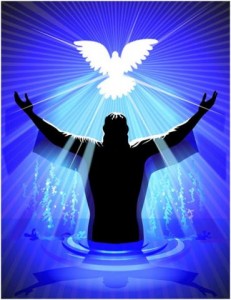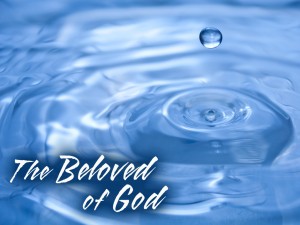See How Much God Loves Us…
And when Jesus had been baptized, just as he came up from the water,
suddenly the heavens were opened to him and he saw the Spirit of God
descending like a dove and alighting on him. And a voice from heaven said,
“This is my Son, the Beloved, with whom I am well pleased.” —Matthew 3:16-17
 This Sunday we celebrate the Baptism of Jesus. It is a wonderful opportunity to remember our Baptisms (and the meaning of Baptism). In fact, I will take a liturgical moment this Sunday to do just that. Granted, some may find themselves perplexed by the ritual while others may experience an out-and-out-negative response to the experience—for the meaning of Baptism can remain a mystery to the average Protestant church goer. Splashing oneself with water may make no sense or it might be reminiscent of that act our Roman Catholic brothers and sister do when they walk in and out of their church. So it is a risk I take, creating a liturgical moment to remember our baptisms and get you all wet… but I am willing to rise to the challenge!
This Sunday we celebrate the Baptism of Jesus. It is a wonderful opportunity to remember our Baptisms (and the meaning of Baptism). In fact, I will take a liturgical moment this Sunday to do just that. Granted, some may find themselves perplexed by the ritual while others may experience an out-and-out-negative response to the experience—for the meaning of Baptism can remain a mystery to the average Protestant church goer. Splashing oneself with water may make no sense or it might be reminiscent of that act our Roman Catholic brothers and sister do when they walk in and out of their church. So it is a risk I take, creating a liturgical moment to remember our baptisms and get you all wet… but I am willing to rise to the challenge!
In fact, in the midst of the post-modern church a pastor is regularly presented with the challenge of Baptism. “So why,” you ask, “would you call Baptism a challenge? We love it when you sing ’Jesus loves me’ and present those beautiful babies to the congregation after they have been sprinkled and proclaimed a child of the church.” But more often than not, given the growing number of ‘Nones,’ SBNR’s and those disillusioned by Religion/Christianity/The Church, when a family calls to ask about baptizing a child there is a paucity of awareness about the meaning of baptism or why and how we do it. Usually at least one member of the family is reticent (at best)—imagining some hocus pocus or indoctrination into a system in which they are not really a part—and are only willing to go along in order to get the grandparents to back off from the pressure they are exerting to “get that baby done.”
I can even admit to you that when I listen to the questions and wonderings of post modern parents who cock their heads and ask, “Why should I even do this when I am not sure what I believe myself,” I understand the questions and concerns. Why do we do this? What does it mean? Does anything really happen when we bless that water and pour it over the baby’s head? And in our day and age, when so many folk are themselves questioning the traditional church—does infant baptism make sense or should we let our kids make their own choice when they come of age?
At times, I wonder where the line is between administering and honoring the sacrament and meeting people where they are so that we can connect them to a faith community for all the positive reasons that connection offers. Some would say baptism are an opportunity for evangelism, while others believe we should only do it if the family is ready to sign up for new member classes. I have had many a theological conversation with colleagues in which we have wondered aloud, “Do we somehow devalue the sacrament when we adjust the language and/or open the sacrament to those who may not be planning to raise their children as Christians?” I know what some of my seminary teachers and mentors would say.
Yet, I think there is a place to stand, straddling the line, where one can both honor the meaning of the sacrament and meet folk where they need to be in the hopes that through the education one gives a family and the experience of the Holy Spirit and community that takes place each time we celebrate the sacrament—people’s lives are changed (even if only a little) and the sacrament it becomes more than a reason for a pretty white garment and a party for the family after church. (At least I hope this is true, because I practice a wide open stance when it comes to standing on the line).
So—how might we remember our baptism? We begin with the meaning of baptism. Baptism seals God’s promise of love and acceptance. Baptism is a spiritual birth out of which we take our place in God’s world and God’s children. Baptism is a sacred obligation through which we promise to love and rear our children to be what God wants for them: lovers of life, makers of peace, and instruments of justice. Baptism consecrates our bond to family—our family of origin and our family of faith. Baptism is an act of worship in which the whole faith community participates, promising to help raise-up followers of Jesus, and nurture and support those people in their prayers and actions. In other words, baptism is a covenant through which the baptized is embraced by the whole household of God. And finally, baptism is an act of faith and a confession of faith. When you bring a child or yourself for baptism, you come declaring your hope and offering yourself, by God’s grace, to seek a better world for all.
In the liturgy of the sacrament we trace the sign of the cross on the forehead with these words, “The Holy Spirit be upon you, child of God, disciple of Christ, member of the church.” And then, the best part is next. We present the newly baptized and say, “See how much God loves us that we should be called the children of God.” See how much God loves us that we are sealed with a kiss and called ‘beloved’.
 As you remember your baptism this week, take some time to remember the ways your faith walk has caused you to be seekers of peace and justice and lovers of all of creation. Remember the many people and faith communities that have nurtured you and supported you through all of the ups and downs of life and faith. Remember the covenantal ways you have been connected—large and small to the triune God, to God’s people and to God’s creation and celebrate those ties. And most importantly, remember how deeply and thoroughly God loves you and your children—God said it to Jesus and God says it to us—”this is my child, my beloved, in whom I am well pleased.”
As you remember your baptism this week, take some time to remember the ways your faith walk has caused you to be seekers of peace and justice and lovers of all of creation. Remember the many people and faith communities that have nurtured you and supported you through all of the ups and downs of life and faith. Remember the covenantal ways you have been connected—large and small to the triune God, to God’s people and to God’s creation and celebrate those ties. And most importantly, remember how deeply and thoroughly God loves you and your children—God said it to Jesus and God says it to us—”this is my child, my beloved, in whom I am well pleased.”
With blessing and prayer, Rev. Wendy Miller Olapade/revwdmiller@comcast.net
